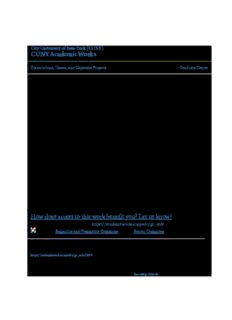Table Of ContentCCiittyy UUnniivveerrssiittyy ooff NNeeww YYoorrkk ((CCUUNNYY))
CCUUNNYY AAccaaddeemmiicc WWoorrkkss
Dissertations, Theses, and Capstone Projects CUNY Graduate Center
6-2017
AAssppeeccttss ooff QQuuaannttiififieerr FFllooaatt iinn TThhaaii
Khanin Chaiphet
The Graduate Center, City University of New York
How does access to this work benefit you? Let us know!
More information about this work at: https://academicworks.cuny.edu/gc_etds/2048
Discover additional works at: https://academicworks.cuny.edu
This work is made publicly available by the City University of New York (CUNY).
Contact: [email protected]
ASPECTS OF QUANTIFIER FLOAT IN THAI
by
KHANIN CHAIPHET
A master’s thesis submitted to the Graduate Faculty in Linguistics in partial fulfillment of the
requirements for the degree of Master of Arts, The City University of New York
2017
© 2017
KHANIN CHAIPHET
All Rights Reserved
!ii
Aspects of Quantifier Float in Thai
by
Khanin Chaiphet
This manuscript has been read and accepted for the Graduate Faculty in Linguistics
in satisfaction of the thesis requirement for the degree of Master of Arts.
____________________ __________________________________________
Date William Haddican
Thesis Advisor
______________________ __________________________________________
Date Gita Martohardjono
Executive Officer
THE CITY UNIVERSITY OF NEW YORK
ABSTRACT
!iii
Aspects of Quantifier Float in Thai
by
Khanin Chaiphet
Advisor: William Haddican
Research on Thai Q(uantifier)-float attempts to manifest the problems for each of its analysis.
For the adverbial analysis, the Japanese data show that the floating quantifiers can be associated
with both distributive and plurality-of-events readings while Thai does not distinguish between
these two readings. For the stranding analysis, the differences from English-Thai comparative
data show that Thai floating quantifiers often occur in positions where their associated NPs could
not have previously occupied or have been moved from, and thus cannot be analyzed as resulting
from stranding. As a solution, Thai Q-float is postulated as an instance of rightward movement
(extraposition) but this idea has recently been rejected and replaced with the Quantifier Raising
(QR) analysis. This thesis aims to defend the extraposition approach by providing empirically
supporting data to confirm the availability of extraposition in Thai, and to undercut the
motivation for the recent QR analysis. I propose that this QR analysis is problematic since its
data face some empirical problems. These problems result from the native speakers’ judgments
on the data that are used to illustrate the locality restrictions and scopal effects of the floating
quantifiers in Thai. It is found that some data contrast to the native speakers’ judgments while
some mislead them to agree with the judgments by the author.
i! v
ACKNOWLEDGEMENTS
First and foremost, I would like to thank my thesis advisor, Professor Bill Haddican, for
generously guiding and sharing his expertise with me. It was an honor to have the chance to
work with and learn from him. This thesis could not have been completed without his help, and I
am deeply grateful to that.
I would like to extend my appreciation to Professor Michael Newman for having advised
and encouraged me, especially when I was applying to the doctoral program. He told me “do
your best and don’t let yourself reject them”. I remember his words by heart, and will take them
with me throughout this journey.
I also would like to express my gratitude to Professor Saranya Savetamalya, Professor
Miki Makihara, Professor Jason Kandybowicz, and Professor Janet Dean Fodor for being very
inspirational and helpful. It was a great pleasure knowing and learning form these amazingly
intelligent people.
Finally and most importantly, thank you to my family for constantly supporting and
encouraging me onwards throughout my studies in the United States, and all my friends in NYC
for being the great life counselors and morale boosters. I love you all so much.
!v
TABLE OF CONTENTS
Abstract iv
Acknowledgements v
Table of contents vi
List of tables, charts, and figures viii
1. Introduction 1
2. Overview of the Quantifier Float in Thai 3
2.1 Language background 3
2.2 Quantifiers in Thai 3
2.3 What quantifiers can float? 5
2.4 The distribution of Thai Q-float 6
2.5 Q-float and scope 8
3. Previous Analyses and their problems 10
3.1 The non-movement analysis: Q-float as adverbs 10
3.2 The movement analysis: Stranding 12
3.3 Against the extraposition analysis 17
4. The current analysis 20
4.1 The Q-float as QR analysis 20
4.2 Motivations for movement 21
4.3 Problems for the QR analysis 24
4.3.1 Resurrecting the extraposition 24
v! i
4.3.2 Judgment problems on the QR analysis 27
5. Conclusion 35
Bibliography 37
!vii
LIST OF TABLES, CHARTS, AND FIGURES
Table (3): Classification of Thai quantifiers: their requirement of classifiers and strengths 4
Table (13): The effects of Q-float on scope relative to negation 10
1. Introduction
One of the most intriguing phenomena about Thai is that almost all quantifiers are able to
separate themselves from their associated noun (a subject or an object), although these disjointed
syntactic elements are still co-interpreted. This phenomenon is known as Q(uantifier)-float
(Baltin 1978; Sportiche 1988). The examples of this phenomenon are provided in (1) and (2).
(1) a. Subject Q-float
(i) nak.riian thuk-khon [ duum naam ] muuawaannii1
VP
student every-CLFperson drink water yesterday
(ii) nak.riian [ duum naam ] thuk-khon muuawaannii
VP
student drink water every-CLFperson yesterday
(both) ‘Every student drank water yesterday.’
b. Object Q-float
(i) nak.riian [ duum naam thuk-kɛɛw ] muuawaannii
VP
student drink water every-CLFglass yesterday
(ii) nak.riian [ duum naam ] muuawaannii thuk-kɛɛw
VP
student drink water yesterday every-CLFglass
(both) ‘The students drank every glass of water yesterday.’
1 For the sake of brevity, tone markers are omitted and special phonetic symbols are kept to an absolute minimum
throughout this thesis.
!1
Description:Research on Thai Q(uantifier)-float attempts to manifest the problems for each of its analysis. For the adverbial . functional structure of the noun phrase. He also proposes The hidden structure of Thai noun phrases. Ph.D. thesis

